Anxiety and Panic Attacks: Health Promotion Strategies for Adults
VerifiedAdded on 2022/12/30
|12
|1175
|82
Presentation
AI Summary
This presentation analyzes the impact of anxiety and panic attacks on adult life, focusing on public health priorities and health promotion techniques. It explores the negative and positive impacts of anxiety, considering ethical and practical aspects of healthcare accessibility and affordability. The presentation discusses needs assessment, aims, objectives, and intervention outlines, including ethical theories, affordability, and social justice models. It details cognitive theories of anxiety, denial, and the controversial positive impacts of anxiety. The evaluation will be based on the study's aims and objectives, theories, models, and approaches to reach reliable conclusions. The presentation emphasizes the importance of awareness and the role of organizations in making treatments available. It also highlights methodologies used by healthcare organizations in resource acquisition and ensuring equal access to healthcare facilities.
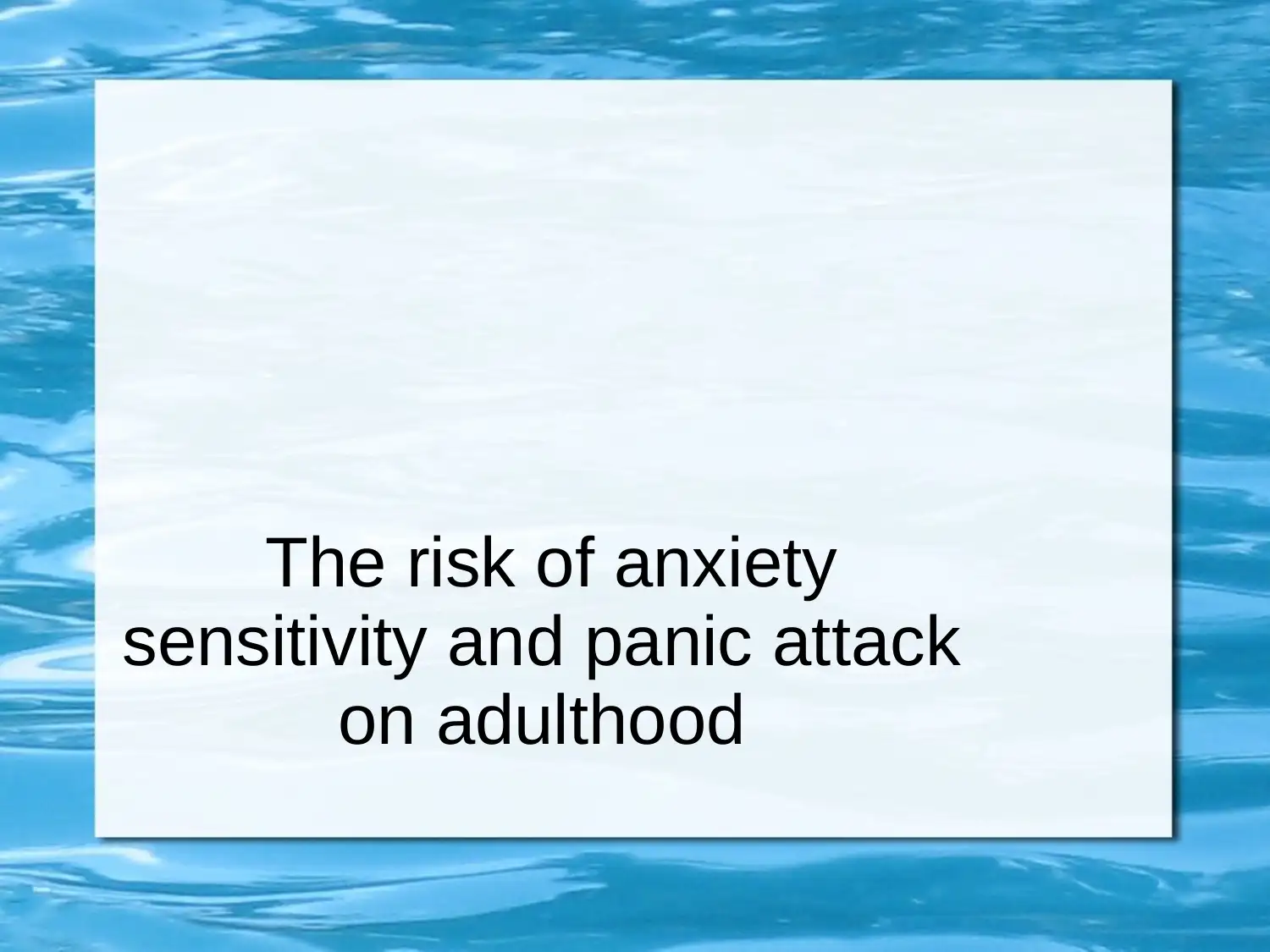
The risk of anxiety
sensitivity and panic attack
on adulthood
sensitivity and panic attack
on adulthood
Paraphrase This Document
Need a fresh take? Get an instant paraphrase of this document with our AI Paraphraser
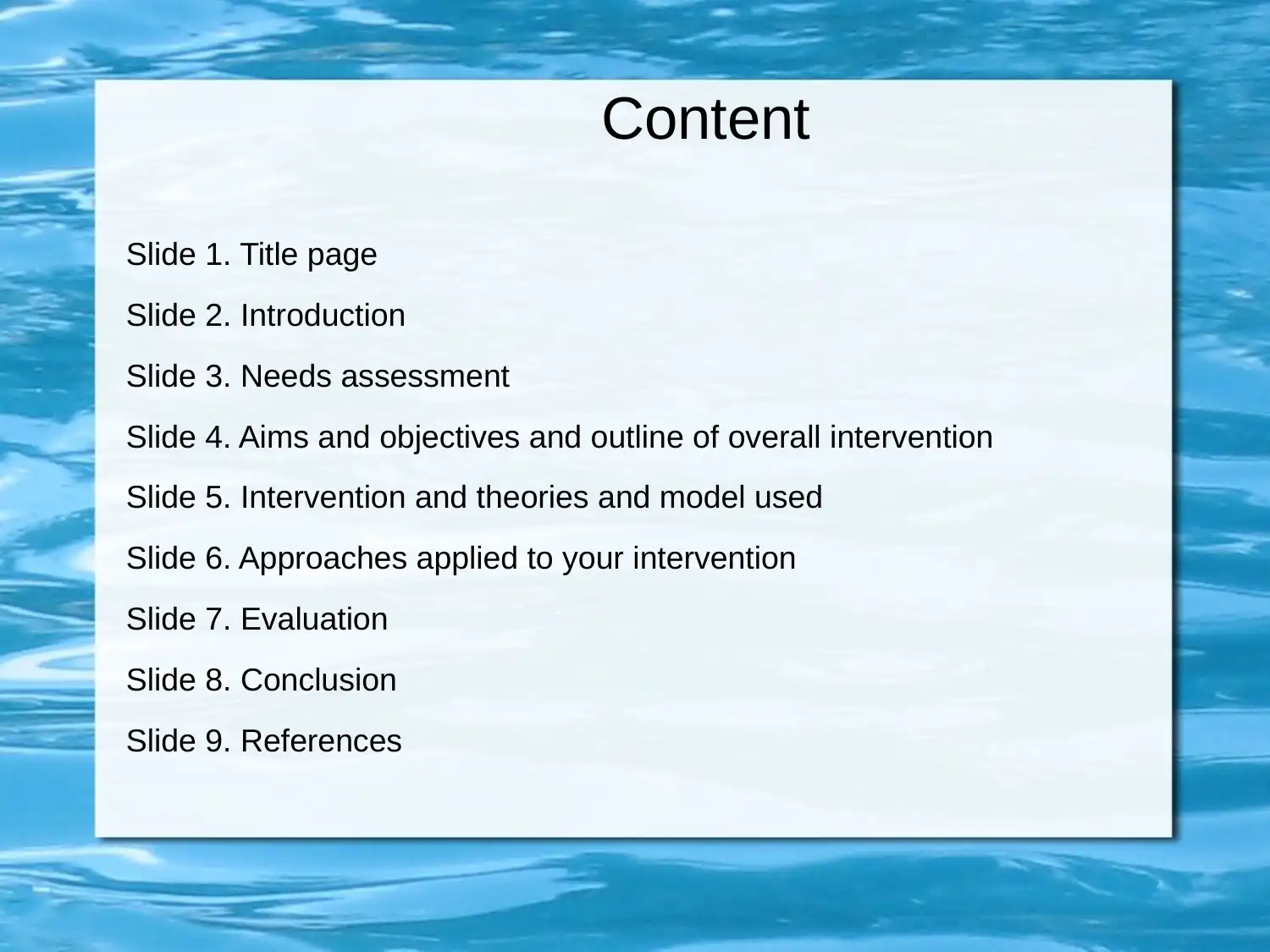
Content
Slide 1. Title page
Slide 2. Introduction
Slide 3. Needs assessment
Slide 4. Aims and objectives and outline of overall intervention
Slide 5. Intervention and theories and model used
Slide 6. Approaches applied to your intervention
Slide 7. Evaluation
Slide 8. Conclusion
Slide 9. References
Slide 1. Title page
Slide 2. Introduction
Slide 3. Needs assessment
Slide 4. Aims and objectives and outline of overall intervention
Slide 5. Intervention and theories and model used
Slide 6. Approaches applied to your intervention
Slide 7. Evaluation
Slide 8. Conclusion
Slide 9. References
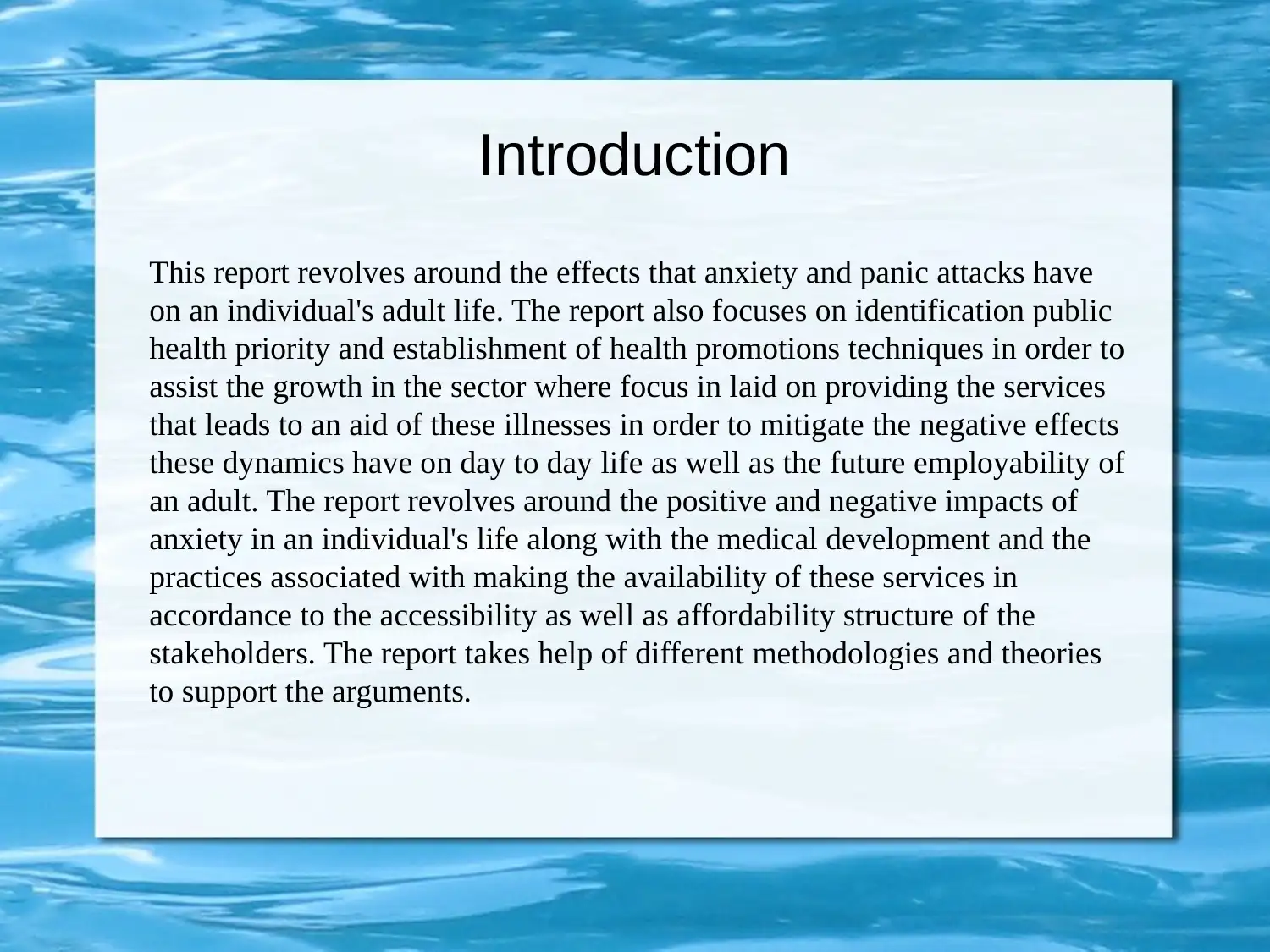
Introduction
This report revolves around the effects that anxiety and panic attacks have
on an individual's adult life. The report also focuses on identification public
health priority and establishment of health promotions techniques in order to
assist the growth in the sector where focus in laid on providing the services
that leads to an aid of these illnesses in order to mitigate the negative effects
these dynamics have on day to day life as well as the future employability of
an adult. The report revolves around the positive and negative impacts of
anxiety in an individual's life along with the medical development and the
practices associated with making the availability of these services in
accordance to the accessibility as well as affordability structure of the
stakeholders. The report takes help of different methodologies and theories
to support the arguments.
This report revolves around the effects that anxiety and panic attacks have
on an individual's adult life. The report also focuses on identification public
health priority and establishment of health promotions techniques in order to
assist the growth in the sector where focus in laid on providing the services
that leads to an aid of these illnesses in order to mitigate the negative effects
these dynamics have on day to day life as well as the future employability of
an adult. The report revolves around the positive and negative impacts of
anxiety in an individual's life along with the medical development and the
practices associated with making the availability of these services in
accordance to the accessibility as well as affordability structure of the
stakeholders. The report takes help of different methodologies and theories
to support the arguments.
⊘ This is a preview!⊘
Do you want full access?
Subscribe today to unlock all pages.

Trusted by 1+ million students worldwide
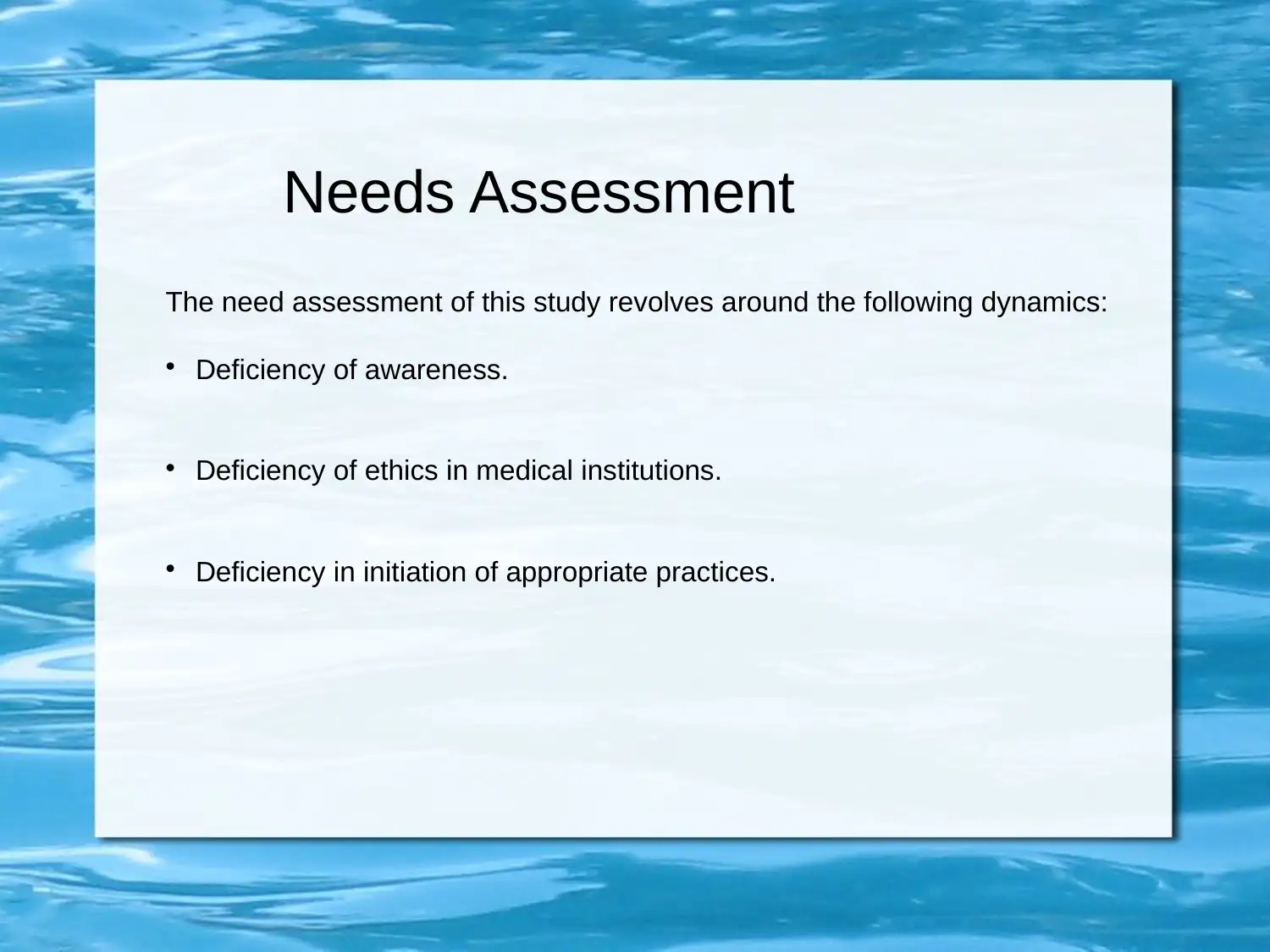
Needs Assessment
The need assessment of this study revolves around the following dynamics:
Deficiency of awareness.
Deficiency of ethics in medical institutions.
Deficiency in initiation of appropriate practices.
The need assessment of this study revolves around the following dynamics:
Deficiency of awareness.
Deficiency of ethics in medical institutions.
Deficiency in initiation of appropriate practices.
Paraphrase This Document
Need a fresh take? Get an instant paraphrase of this document with our AI Paraphraser
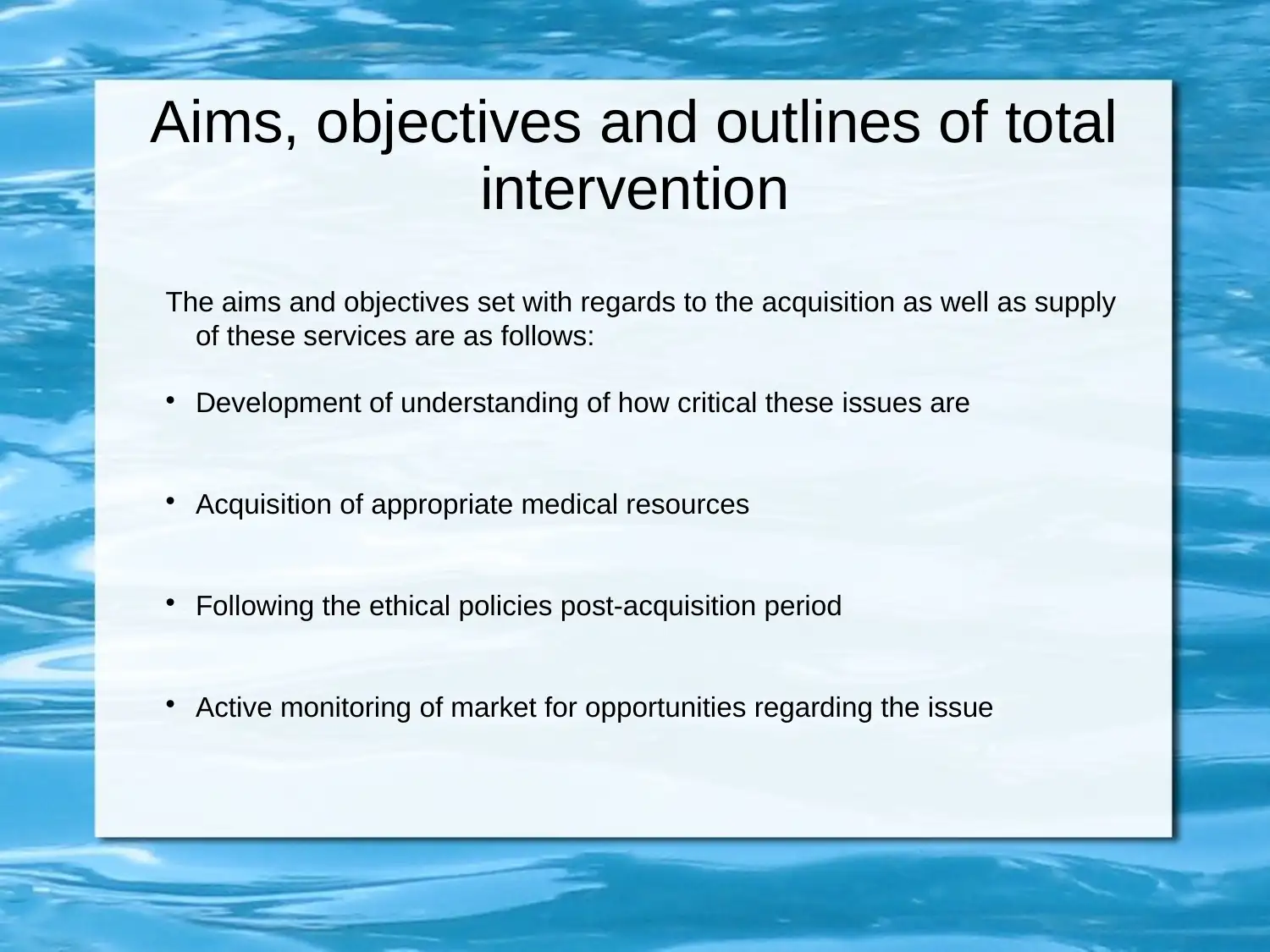
Aims, objectives and outlines of total
intervention
The aims and objectives set with regards to the acquisition as well as supply
of these services are as follows:
Development of understanding of how critical these issues are
Acquisition of appropriate medical resources
Following the ethical policies post-acquisition period
Active monitoring of market for opportunities regarding the issue
intervention
The aims and objectives set with regards to the acquisition as well as supply
of these services are as follows:
Development of understanding of how critical these issues are
Acquisition of appropriate medical resources
Following the ethical policies post-acquisition period
Active monitoring of market for opportunities regarding the issue
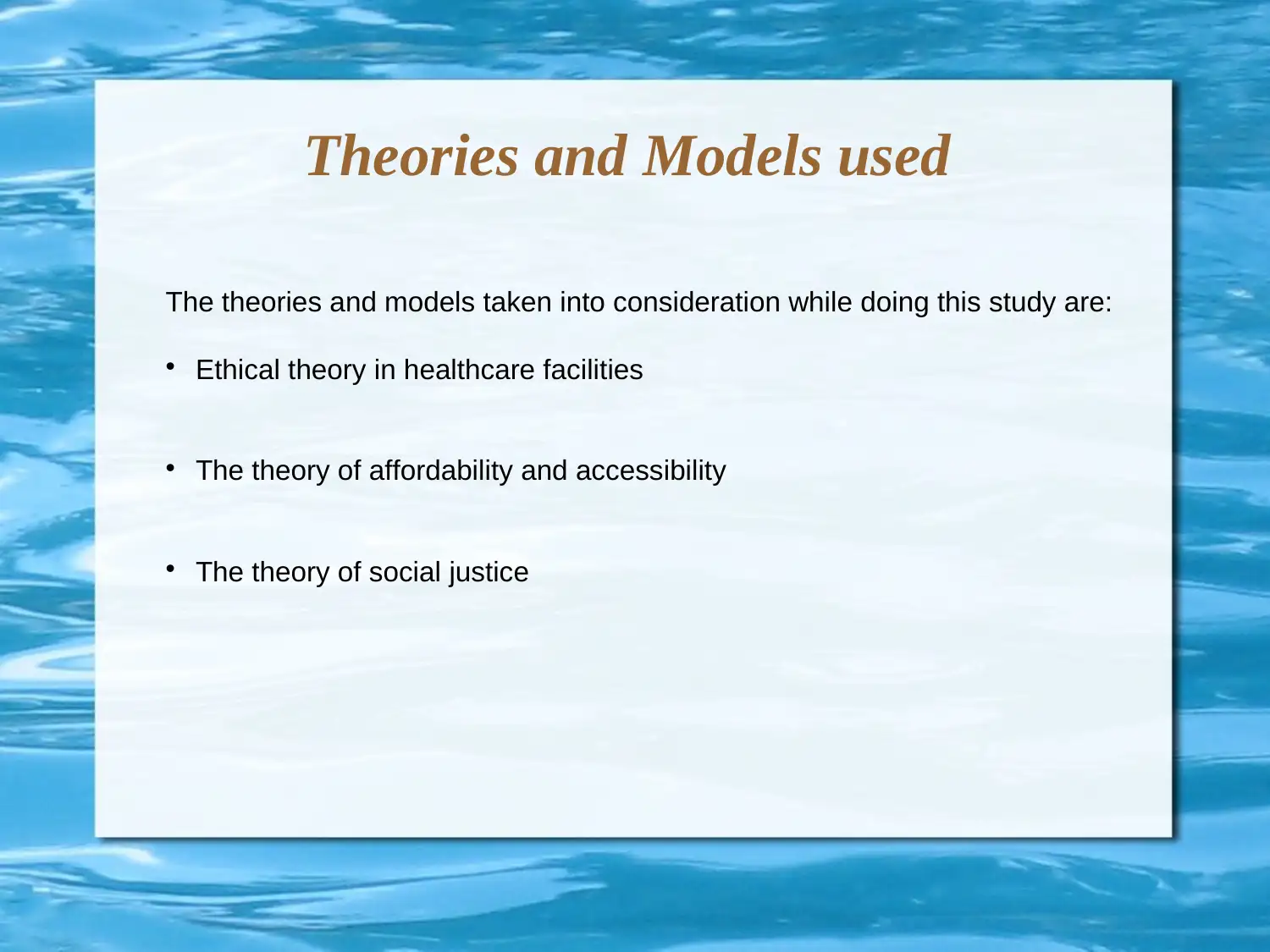
Theories and Models used
The theories and models taken into consideration while doing this study are:
Ethical theory in healthcare facilities
The theory of affordability and accessibility
The theory of social justice
The theories and models taken into consideration while doing this study are:
Ethical theory in healthcare facilities
The theory of affordability and accessibility
The theory of social justice
⊘ This is a preview!⊘
Do you want full access?
Subscribe today to unlock all pages.

Trusted by 1+ million students worldwide
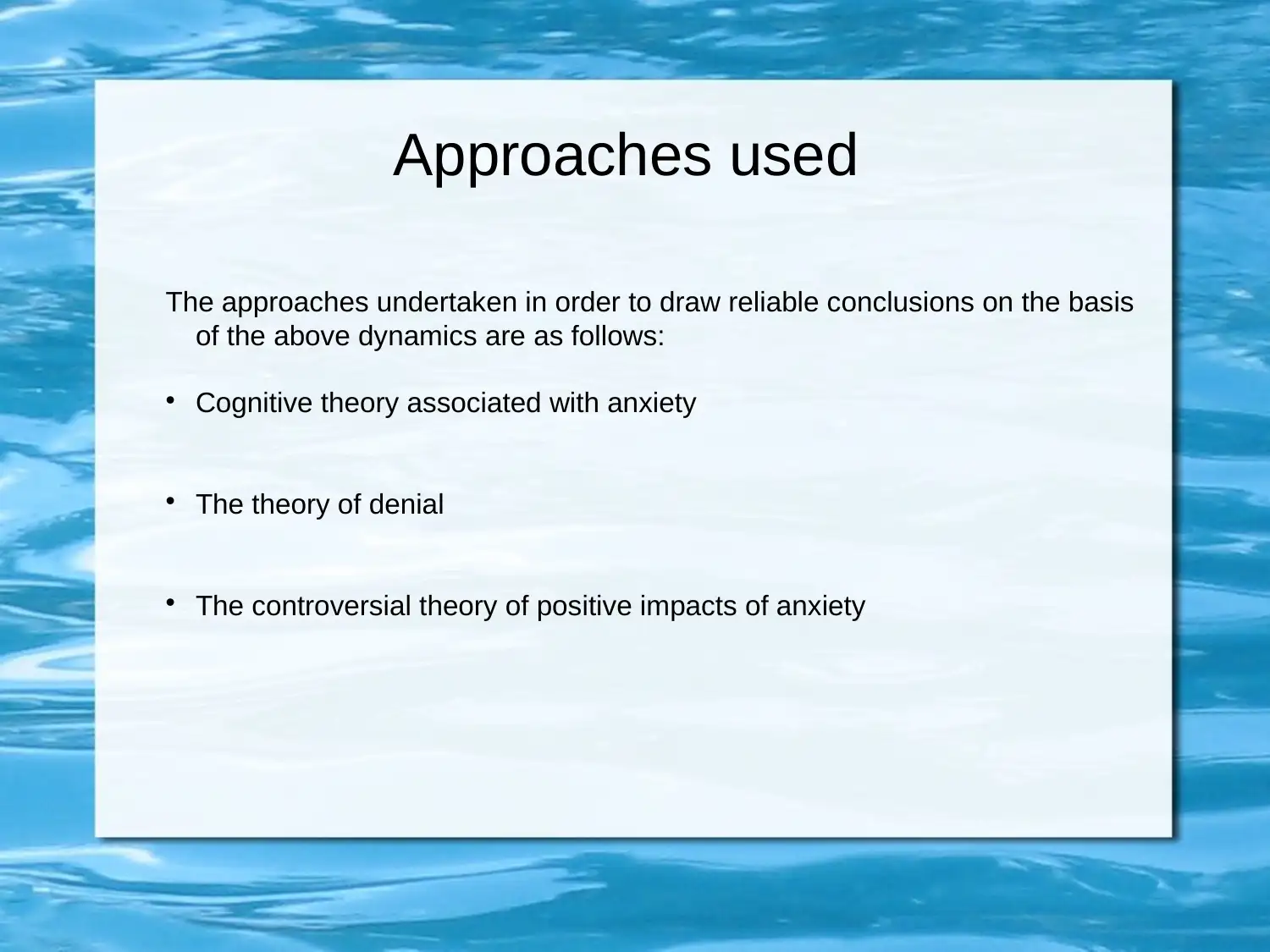
Approaches used
The approaches undertaken in order to draw reliable conclusions on the basis
of the above dynamics are as follows:
Cognitive theory associated with anxiety
The theory of denial
The controversial theory of positive impacts of anxiety
The approaches undertaken in order to draw reliable conclusions on the basis
of the above dynamics are as follows:
Cognitive theory associated with anxiety
The theory of denial
The controversial theory of positive impacts of anxiety
Paraphrase This Document
Need a fresh take? Get an instant paraphrase of this document with our AI Paraphraser
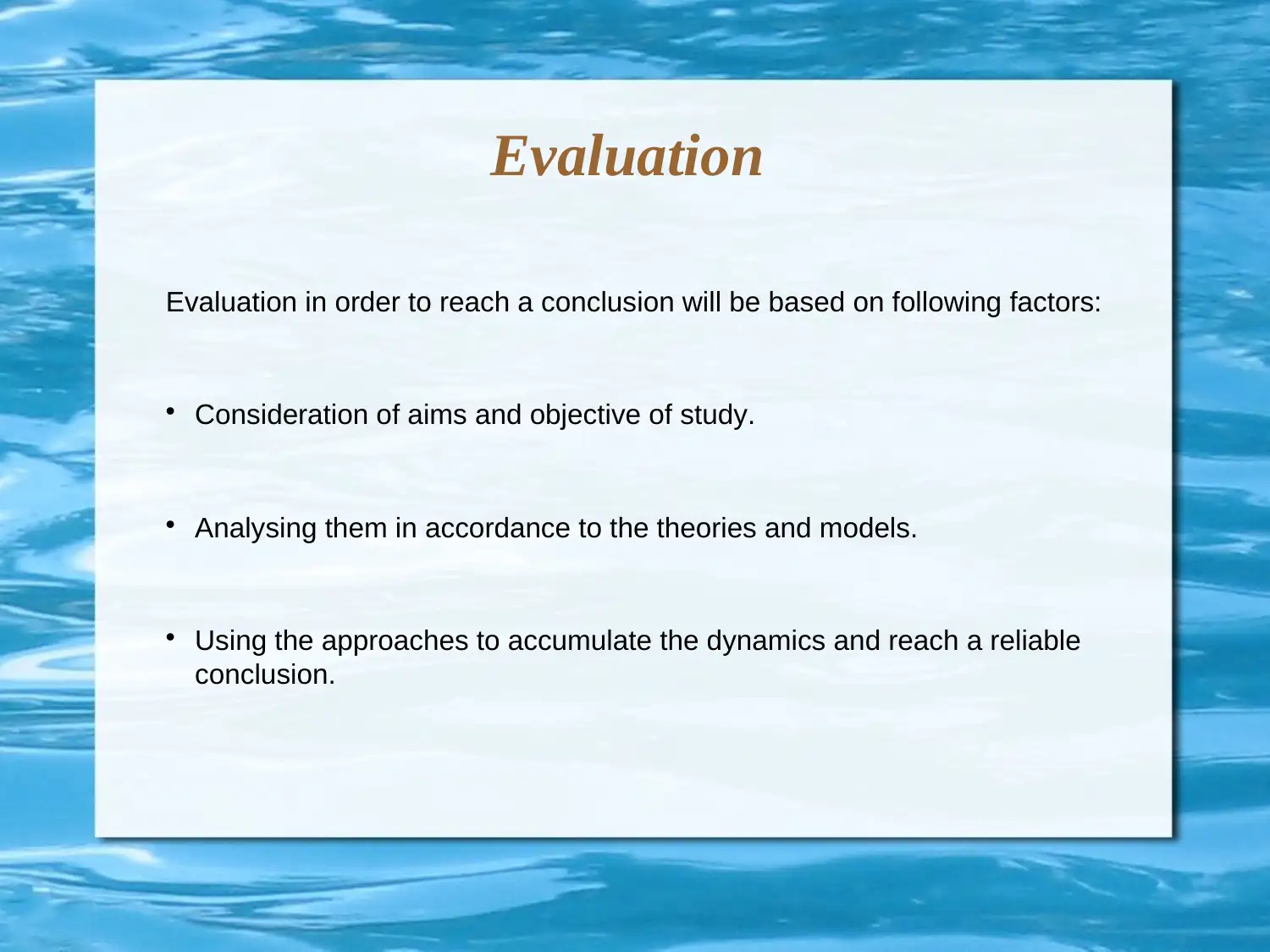
Evaluation
Evaluation in order to reach a conclusion will be based on following factors:
Consideration of aims and objective of study.
Analysing them in accordance to the theories and models.
Using the approaches to accumulate the dynamics and reach a reliable
conclusion.
Evaluation in order to reach a conclusion will be based on following factors:
Consideration of aims and objective of study.
Analysing them in accordance to the theories and models.
Using the approaches to accumulate the dynamics and reach a reliable
conclusion.
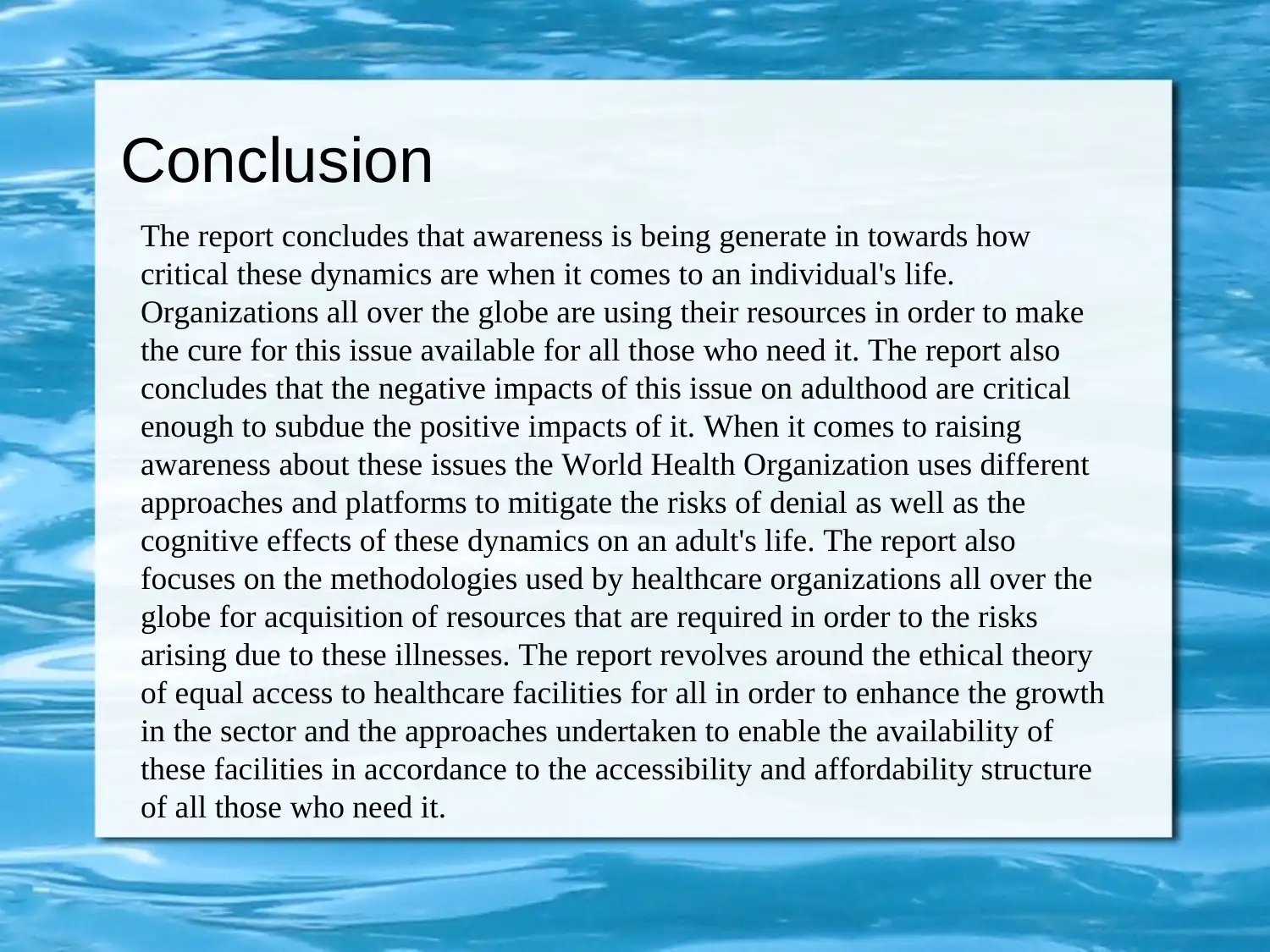
Conclusion
The report concludes that awareness is being generate in towards how
critical these dynamics are when it comes to an individual's life.
Organizations all over the globe are using their resources in order to make
the cure for this issue available for all those who need it. The report also
concludes that the negative impacts of this issue on adulthood are critical
enough to subdue the positive impacts of it. When it comes to raising
awareness about these issues the World Health Organization uses different
approaches and platforms to mitigate the risks of denial as well as the
cognitive effects of these dynamics on an adult's life. The report also
focuses on the methodologies used by healthcare organizations all over the
globe for acquisition of resources that are required in order to the risks
arising due to these illnesses. The report revolves around the ethical theory
of equal access to healthcare facilities for all in order to enhance the growth
in the sector and the approaches undertaken to enable the availability of
these facilities in accordance to the accessibility and affordability structure
of all those who need it.
The report concludes that awareness is being generate in towards how
critical these dynamics are when it comes to an individual's life.
Organizations all over the globe are using their resources in order to make
the cure for this issue available for all those who need it. The report also
concludes that the negative impacts of this issue on adulthood are critical
enough to subdue the positive impacts of it. When it comes to raising
awareness about these issues the World Health Organization uses different
approaches and platforms to mitigate the risks of denial as well as the
cognitive effects of these dynamics on an adult's life. The report also
focuses on the methodologies used by healthcare organizations all over the
globe for acquisition of resources that are required in order to the risks
arising due to these illnesses. The report revolves around the ethical theory
of equal access to healthcare facilities for all in order to enhance the growth
in the sector and the approaches undertaken to enable the availability of
these facilities in accordance to the accessibility and affordability structure
of all those who need it.
⊘ This is a preview!⊘
Do you want full access?
Subscribe today to unlock all pages.

Trusted by 1+ million students worldwide
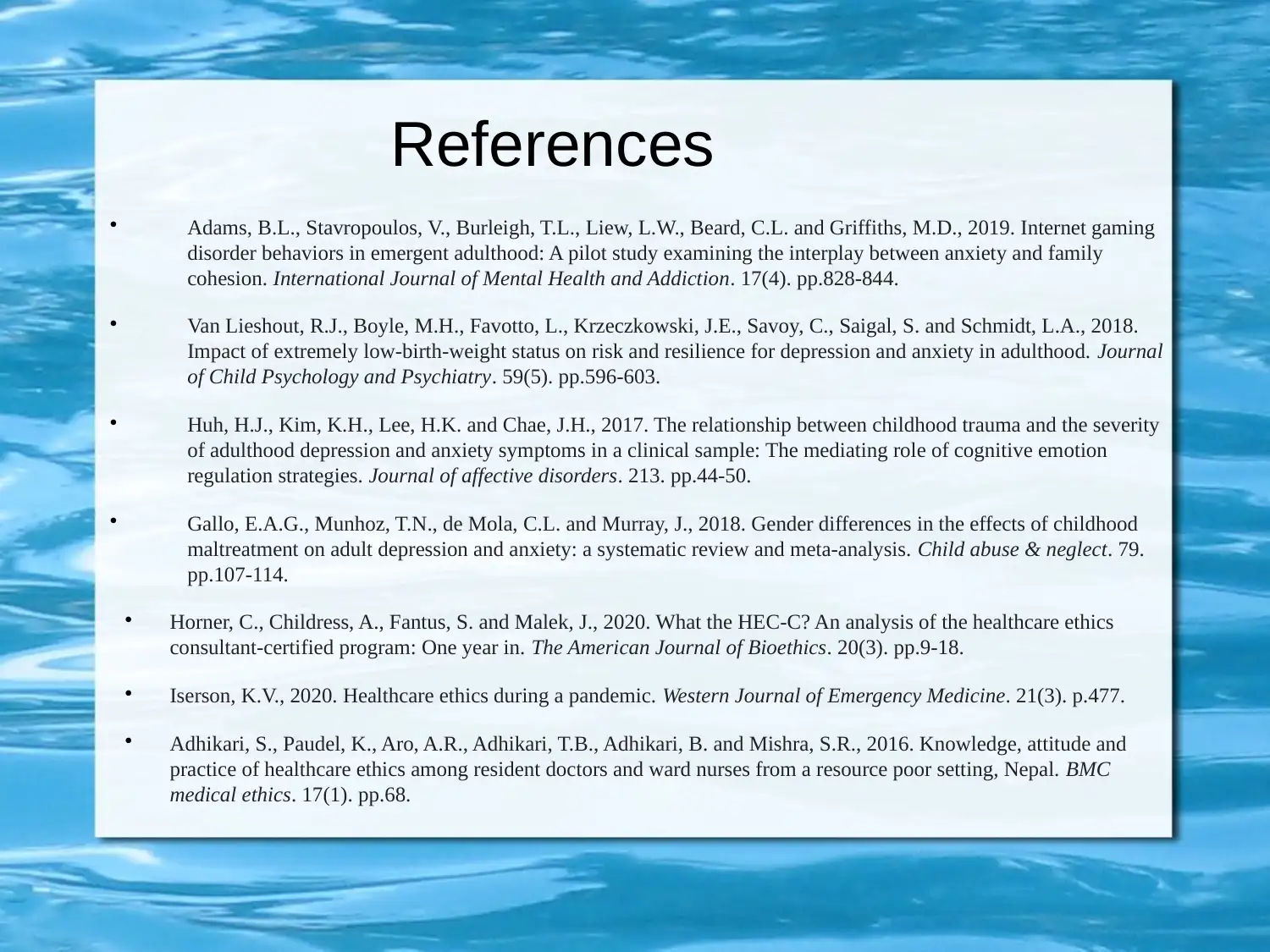
References
Adams, B.L., Stavropoulos, V., Burleigh, T.L., Liew, L.W., Beard, C.L. and Griffiths, M.D., 2019. Internet gaming
disorder behaviors in emergent adulthood: A pilot study examining the interplay between anxiety and family
cohesion. International Journal of Mental Health and Addiction. 17(4). pp.828-844.
Van Lieshout, R.J., Boyle, M.H., Favotto, L., Krzeczkowski, J.E., Savoy, C., Saigal, S. and Schmidt, L.A., 2018.
Impact of extremely low‐birth‐weight status on risk and resilience for depression and anxiety in adulthood. Journal
of Child Psychology and Psychiatry. 59(5). pp.596-603.
Huh, H.J., Kim, K.H., Lee, H.K. and Chae, J.H., 2017. The relationship between childhood trauma and the severity
of adulthood depression and anxiety symptoms in a clinical sample: The mediating role of cognitive emotion
regulation strategies. Journal of affective disorders. 213. pp.44-50.
Gallo, E.A.G., Munhoz, T.N., de Mola, C.L. and Murray, J., 2018. Gender differences in the effects of childhood
maltreatment on adult depression and anxiety: a systematic review and meta-analysis. Child abuse & neglect. 79.
pp.107-114.
Horner, C., Childress, A., Fantus, S. and Malek, J., 2020. What the HEC-C? An analysis of the healthcare ethics
consultant-certified program: One year in. The American Journal of Bioethics. 20(3). pp.9-18.
Iserson, K.V., 2020. Healthcare ethics during a pandemic. Western Journal of Emergency Medicine. 21(3). p.477.
Adhikari, S., Paudel, K., Aro, A.R., Adhikari, T.B., Adhikari, B. and Mishra, S.R., 2016. Knowledge, attitude and
practice of healthcare ethics among resident doctors and ward nurses from a resource poor setting, Nepal. BMC
medical ethics. 17(1). pp.68.
Adams, B.L., Stavropoulos, V., Burleigh, T.L., Liew, L.W., Beard, C.L. and Griffiths, M.D., 2019. Internet gaming
disorder behaviors in emergent adulthood: A pilot study examining the interplay between anxiety and family
cohesion. International Journal of Mental Health and Addiction. 17(4). pp.828-844.
Van Lieshout, R.J., Boyle, M.H., Favotto, L., Krzeczkowski, J.E., Savoy, C., Saigal, S. and Schmidt, L.A., 2018.
Impact of extremely low‐birth‐weight status on risk and resilience for depression and anxiety in adulthood. Journal
of Child Psychology and Psychiatry. 59(5). pp.596-603.
Huh, H.J., Kim, K.H., Lee, H.K. and Chae, J.H., 2017. The relationship between childhood trauma and the severity
of adulthood depression and anxiety symptoms in a clinical sample: The mediating role of cognitive emotion
regulation strategies. Journal of affective disorders. 213. pp.44-50.
Gallo, E.A.G., Munhoz, T.N., de Mola, C.L. and Murray, J., 2018. Gender differences in the effects of childhood
maltreatment on adult depression and anxiety: a systematic review and meta-analysis. Child abuse & neglect. 79.
pp.107-114.
Horner, C., Childress, A., Fantus, S. and Malek, J., 2020. What the HEC-C? An analysis of the healthcare ethics
consultant-certified program: One year in. The American Journal of Bioethics. 20(3). pp.9-18.
Iserson, K.V., 2020. Healthcare ethics during a pandemic. Western Journal of Emergency Medicine. 21(3). p.477.
Adhikari, S., Paudel, K., Aro, A.R., Adhikari, T.B., Adhikari, B. and Mishra, S.R., 2016. Knowledge, attitude and
practice of healthcare ethics among resident doctors and ward nurses from a resource poor setting, Nepal. BMC
medical ethics. 17(1). pp.68.
Paraphrase This Document
Need a fresh take? Get an instant paraphrase of this document with our AI Paraphraser
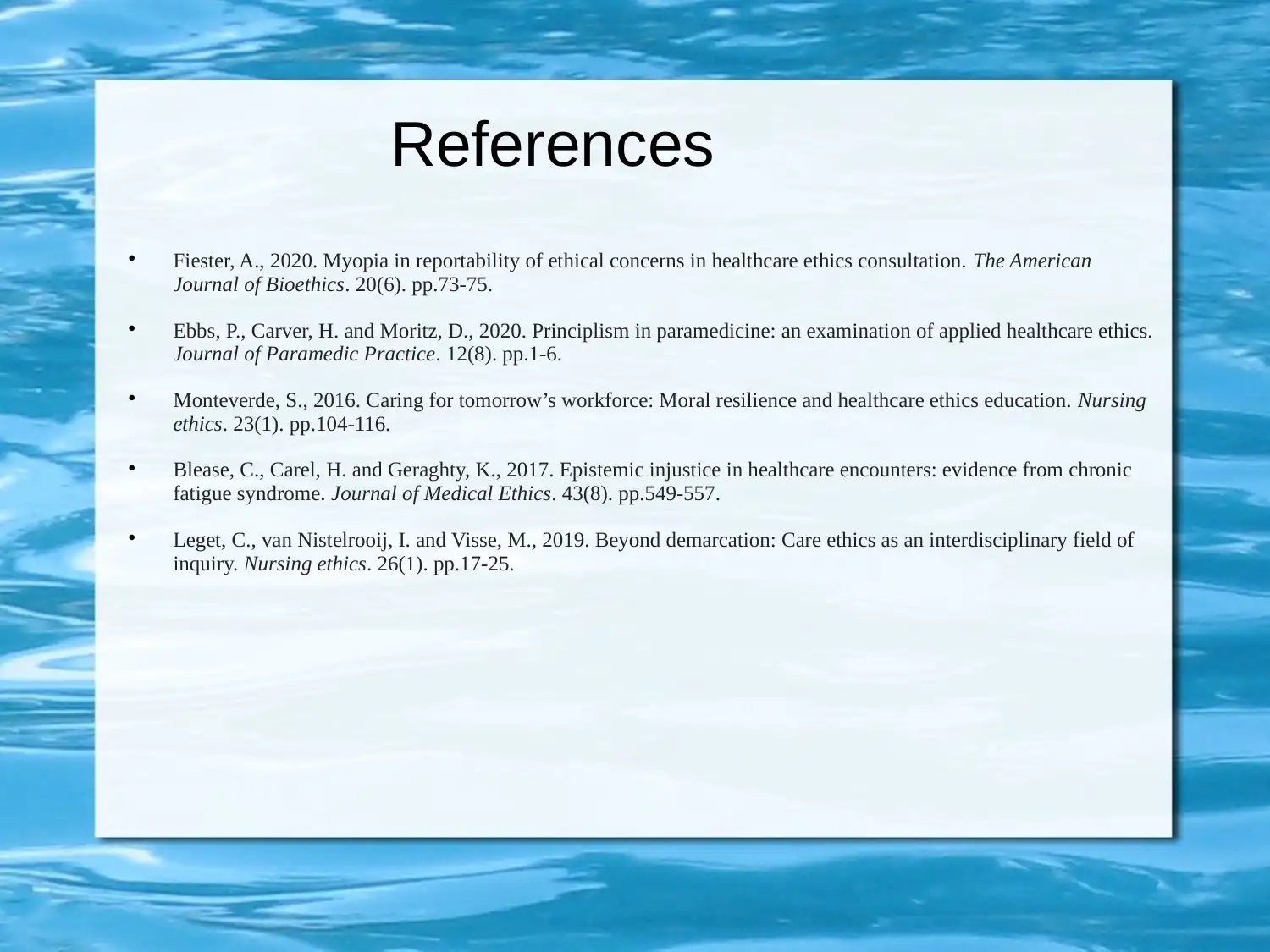
Fiester, A., 2020. Myopia in reportability of ethical concerns in healthcare ethics consultation. The American
Journal of Bioethics. 20(6). pp.73-75.
Ebbs, P., Carver, H. and Moritz, D., 2020. Principlism in paramedicine: an examination of applied healthcare ethics.
Journal of Paramedic Practice. 12(8). pp.1-6.
Monteverde, S., 2016. Caring for tomorrow’s workforce: Moral resilience and healthcare ethics education. Nursing
ethics. 23(1). pp.104-116.
Blease, C., Carel, H. and Geraghty, K., 2017. Epistemic injustice in healthcare encounters: evidence from chronic
fatigue syndrome. Journal of Medical Ethics. 43(8). pp.549-557.
Leget, C., van Nistelrooij, I. and Visse, M., 2019. Beyond demarcation: Care ethics as an interdisciplinary field of
inquiry. Nursing ethics. 26(1). pp.17-25.
References
Journal of Bioethics. 20(6). pp.73-75.
Ebbs, P., Carver, H. and Moritz, D., 2020. Principlism in paramedicine: an examination of applied healthcare ethics.
Journal of Paramedic Practice. 12(8). pp.1-6.
Monteverde, S., 2016. Caring for tomorrow’s workforce: Moral resilience and healthcare ethics education. Nursing
ethics. 23(1). pp.104-116.
Blease, C., Carel, H. and Geraghty, K., 2017. Epistemic injustice in healthcare encounters: evidence from chronic
fatigue syndrome. Journal of Medical Ethics. 43(8). pp.549-557.
Leget, C., van Nistelrooij, I. and Visse, M., 2019. Beyond demarcation: Care ethics as an interdisciplinary field of
inquiry. Nursing ethics. 26(1). pp.17-25.
References

⊘ This is a preview!⊘
Do you want full access?
Subscribe today to unlock all pages.

Trusted by 1+ million students worldwide
1 out of 12
Related Documents
Your All-in-One AI-Powered Toolkit for Academic Success.
+13062052269
info@desklib.com
Available 24*7 on WhatsApp / Email
![[object Object]](/_next/static/media/star-bottom.7253800d.svg)
Unlock your academic potential
Copyright © 2020–2025 A2Z Services. All Rights Reserved. Developed and managed by ZUCOL.


